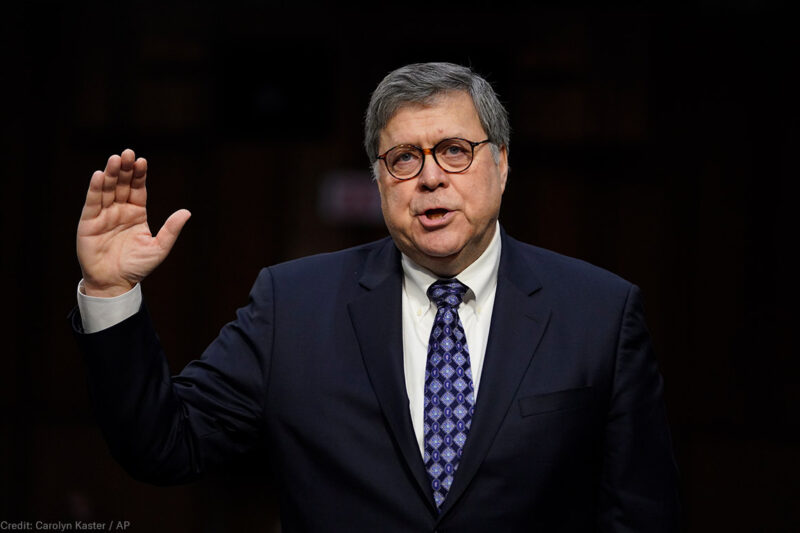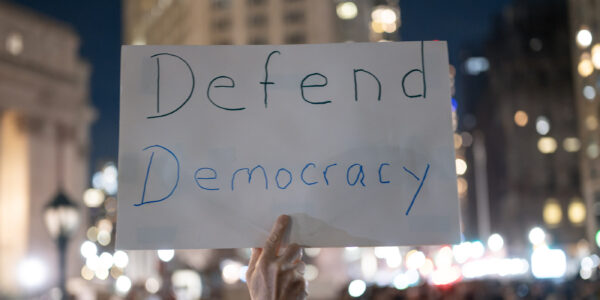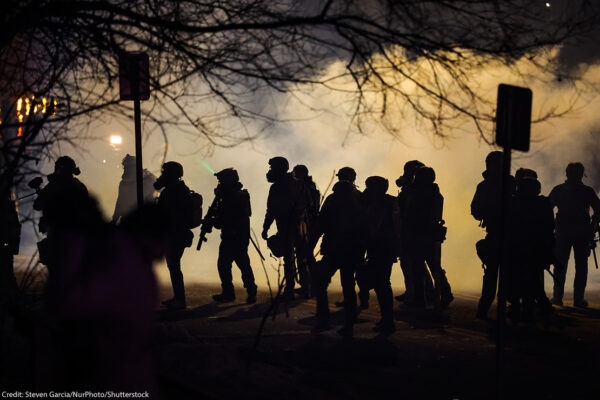The American Public Deserves to See the Mueller Report With as Few Redactions as Possible


Few matters are of greater public interest than the contents of the report produced by Special Counsel Robert Mueller on his recently completed investigation into Russia’s interference in the 2016 presidential election, alleged collusion with the Trump administration, and any interference with the Mueller investigation. Attorney General William Barr has conceded that there is extraordinary public interest in the report. Yet there remain grave concerns that he will redact significant facts from the report, denying the public access to information. At a House hearing, Barr said Tuesday that he intends to release a redacted version of Mueller’s report “within a week” and that he plans to explain his rationale behind each redaction.
The ACLU is committed to transparency and accountability in government, and therefore we have called on Attorney General Barr to transmit the full, unredacted report to Congress for its use in oversight, including determining whether a congressional investigation of possible obstruction of justice by Trump and his associates is warranted. We’ve also called for public release of the report with minimal redactions that are based only on legitimate and lawful justifications.
Politico reported that Barr said lawmakers will be getting a redacted version of the report, saying Congress does not have a right to view sensitive grand jury information. But Congress must be able to read the full report and underlying documents since it is fundamental to its mission, rooted in the Constitution itself, to carry out oversight of the executive branch in our system of checks and balances. This is essential to determine whether there is a need to investigate if the standard for impeachment of the president has been met. According to multiple media reports, the Mueller report has detailed descriptions of evidence related to alleged obstruction of justice, but it does not allegedly conclude whether that obstruction of justice occurred. On Wednesday, Barr said that he would work with Congress to provide access to redacted information as necessary.
It is our position that any redactions in the publicly released report must be assessed in light of what Barr has conceded is the “extraordinary public interest” in the investigation—regardless of the investigation’s conclusions. At the same time, we must not lose sight of the civil liberties and privacy implications of the report’s disclosure.
News reports suggest that Mueller’s team wrote the report, and in particular its summary, with full awareness of the importance of public disclosure, and therefore anything more than minimal redactions ought to raise red flags. In a recent letter to Congress, Barr laid out four categories of material he would consider redacting. While these considerations are appropriate in theory, they have to be implemented with attention to the public disclosure in mind. Redactions should take place only where confidentiality is absolutely necessary.
Grand jury secrecy
Barr said he will redact any material covered by a federal law that generally prohibits the disclosure of information from grand jury investigations. This law mandates confidentiality for information that “would reveal something about the grand jury’s identity, investigation, or deliberation.” It applies most directly to testimony provided in a grand jury proceeding.
Reports have suggested that much of the information Mueller obtained may have come from voluntary interviews, which are not part of grand jury proceedings, and therefore would not be covered by this rule at all. And while Mueller gathered thousands of documents through grand jury subpoenas, the mere fact that a document was obtained through such a subpoena does not prevent its disclosure. So it is likely that the vast majority of the information in the report will not implicate the grand jury secrecy rule. It is critical that Barr apply this rule strictly, so that it does not inappropriately become a “veil of secrecy.”
Grand jury secrecy serves important interests: It prevents premature disclosure of investigations, encourages witnesses to participate, discourages witness tampering, and protects the reputations of those who are investigated but not charged. The rule has its most urgent application while a grand jury is ongoing; once it is concluded, the need for secrecy diminishes. In this context, the grand jury or juries employed by Mueller are likely no longer operating, so there is less need for confidentiality.
Moreover, several courts have held that there are exceptions to grand jury secrecy in “special circumstances.” Barr’s assertion that material covered by this rule “cannot be made public” is incomplete. As the Supreme Court has said, “disclosure is wholly proper where the ends of justice require it.” Several courts have ruled that in special circumstances — and this is certainly a special circumstance — the court that supervised the grand jury can order confidential information be released. That is how some grand jury material from both the President Nixon and President Clinton investigations was disclosed. The U.S. Court of Appeals for the D.C. Circuit recently ruled that it does not recognize such an exception, but other courts of appeals have disagreed, so the matter may eventually require Supreme Court resolution.
Classified information
Barr also said he would redact “material the intelligence community identifies as potentially compromising sensitive sources and methods.” But the only material that Barr is required by law to redact is classified information. And while theoretically the memo may contain some material that if exposed to the public would endanger national security, any such redactions should be applied narrowly.
The ACLU’s long history of litigating First Amendment and Freedom of Information Act lawsuits has shown that this exception to disclosure is often abused by government officials and invoked much more broadly than necessary. When challenged to justify its determinations in court, the government often winds up disclosing troves of documents that it previously asserted could not be disclosed without undermining national security. We should not accept at face value that redactions of purported classified information are necessary to protect sensitive sources and methods. It is critical that Barr justify any redactions of this nature to a neutral third party, either Congress or the courts.
Regardless, classified information that is redacted must be shared with the relevant congressional committee members. They have a “need to know” charge in order to perform their watchdog functions. They are routinely briefed on classified information, and there is no reason to depart from that practice in this setting.
Interference with ongoing investigations
Barr said that he would redact “material that could affect other ongoing matters, including those that the Special Counsel has referred to other Department offices.” The need to preserve the confidentiality of ongoing investigations and the interest in protecting defendants’ fair trial rights are both legitimate, and in ordinary cases, they may conflict with public disclosure. But these concerns need to be measured carefully against the extraordinary interest in public disclosure.
Given the significant matters of public interest involved, there should be strong presumption in favor of disclosure absent a compelling need for confidentiality. In this exceptional context, it may be the case that the interest in disclosure outweighs any potential impact on ongoing investigations. Prosecutors routinely confront similar trade-offs in deciding when to bring indictments and make arrests. The interest in avoiding interference with ongoing investigations is just that, an interest, not an absolute.
In evaluating the trade-offs, the positions of the individuals involved may be relevant. For example, the public interest in information concerning current or former government officials or members of the Trump campaign is greater than the public interest in an unindicted private person, such as a low-level employee at a company that contracted with the Trump campaign. Moreover, given the extraordinary national public interest in the information, concerns about fair trial rights may be best safeguarded through other mechanisms, including jury selection, change of venue, jury instructions, a continuance, and if necessary dismissal of an indictment.
In short, the mere possibility of interference should not justify keeping information from the public that is key to our understanding of threats to our democracy. And in any event, these concerns would not preclude sharing this information in a sealed report to Congress.
Privacy and reputational concerns
Lastly, Barr has said he will redact “information that would unduly infringe on the personal privacy and reputational interests of peripheral third parties.” Personal privacy interests are of the utmost importance to the ACLU. As we've argued in Freedom of Information Act cases, to withhold information an individual’s privacy must be weighed against the public’s interest.
Here, too, the role of the person is relevant. While truly private figures have strong privacy concerns, those who take on public roles have a reduced interest in privacy, and the public has a correspondingly greater interest in their conduct. The “extraordinary public interest” in the issues investigated by Mueller should generally outweigh the privacy interests of public figures, including current or former government or campaign officials.
As an organization committed to civil liberties, civil rights, and the rule of law, we do not take lightly the privacy, fair trial, and investigative concerns raised by disclosing the Mueller report. In this extraordinary case, however, we believe that the public’s interest in disclosure is paramount. The public should be skeptical if Barr produces a report marked by substantial redactions.
Here, more than ever, the public’s right to know must weigh heavily in any balance. Any redactions should be limited to information that is properly covered by grand jury secrecy, would directly endanger national security, unreasonably interfere with ongoing investigations or fair trials, or would reveal the identities of private persons who testified in confidence and are uncharged. All other portions of the Mueller report should be made available to the public. And the full, unredacted report must be sent to Congress immediately.


